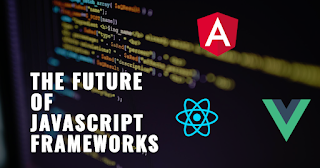JavaScript Frameworks in 2023: Angular, React, and Vue.js
Introduction:
As we step into 2023, the world of web development continues to evolve at a rapid pace. JavaScript frameworks remain at the forefront of this evolution, enabling developers to build powerful, responsive, and dynamic web applications. Among the multitude of JavaScript frameworks available, three stand out prominently: Angular, React, and Vue.js. In this article, we'll take a deep dive into the latest trends and advancements in these frameworks and help you navigate the landscape of modern web development.
Angular:
Angular, developed and maintained by Google, has long been a staple in web application development. Here's what you need to know about its trends in 2023:
-
Angular Ivy: The introduction of Angular Ivy as the default rendering engine has significantly improved the framework's performance and reduced bundle sizes, resulting in faster load times for applications.
-
State Management: Angular's state management has become more streamlined with the integration of NgRx, a powerful state management library inspired by Redux.
-
Server-Side Rendering (SSR): Angular continues to support server-side rendering, making it suitable for SEO-friendly applications and progressive web apps (PWAs).
-
Material Design: The Material Design library for Angular provides a consistent and visually appealing design language for creating user interfaces.
React:
React, maintained by Facebook, is known for its component-based architecture and rapid development. Here's what's happening in the React ecosystem in 2023:
-
React 18: With concurrent mode, React 18 introduces improved performance and user experience by allowing components to work on multiple tasks simultaneously without blocking the main thread.
-
Server Components: The experimental introduction of server components enables rendering components on the server, reducing the load on the client-side for better performance.
-
React Native: React Native, the framework for building mobile applications, continues to gain popularity, offering a shared codebase for web and mobile applications.
-
React Query: React Query simplifies data fetching and caching, making it easier to manage API requests and state in React applications.
Vue.js:
Vue.js is celebrated for its simplicity and ease of use. Developed by a former Google engineer, Evan You, Vue.js remains a strong contender in the world of JavaScript frameworks. In 2023, Vue.js is notable for the following trends:
-
Vue 3: Vue.js has fully embraced Vue 3, with improved performance, reactivity, and TypeScript support.
-
Composition API: The Composition API allows developers to encapsulate logic and state management in reusable functions, enhancing code maintainability.
-
Vite: Vite, a build tool for Vue.js, offers lightning-fast development and builds speeds, making development workflows more efficient.
-
Server Components: Vue 3.2 introduces server components, aligning Vue.js with React's approach to rendering components on the server for improved performance.
Choosing the Right Framework:
When it comes to selecting a JavaScript framework for your project in 2023, consider your project's specific requirements. Angular offers a full-featured framework with a strong focus on TypeScript and enterprise-level applications. React continues to dominate the front-end ecosystem with a vast community and a wide range of libraries. Vue.js, known for its simplicity, is an excellent choice for small to medium-sized projects where rapid development is essential.
Conclusion:
The world of JavaScript frameworks in 2023 offers exciting possibilities for web developers. Whether you choose Angular, React, or Vue.js, staying updated on the latest trends and features is crucial to building modern and performant web applications. Embrace the framework that aligns with your project's goals, and keep innovating in the ever-evolving landscape of web development.

Comments
Post a Comment